Tata Nexon EV vs Mahindra XUV400 comparison: Recharged rematch
India’s homegrown EVs have both been updated, but one more comprehensively than the other.
Published on Oct 10, 2023 09:00:00 AM
41,538 Views
Follow us on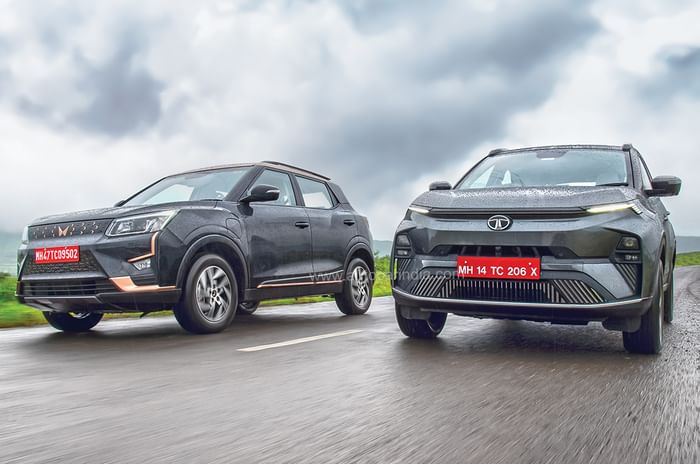
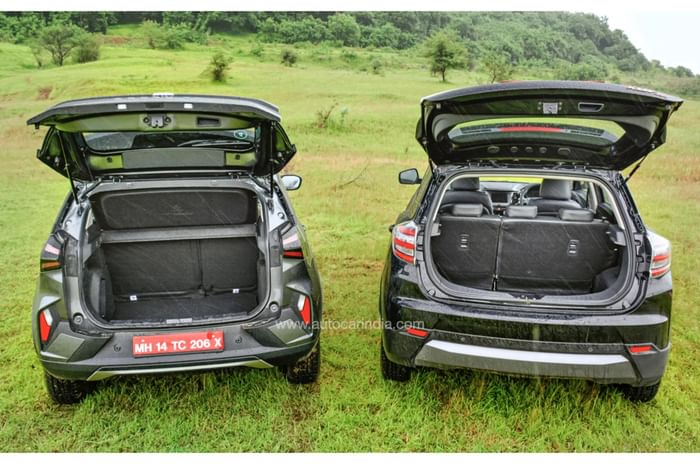
The Nexon EV has been the undisputed king of electric SUVs in India and it even won our comparison against the Mahindra XUV400 the last time we brought these two together. But since then, both SUVs have been updated – the Nexon EV more thoroughly so – and we’ve got them together again for round two. Let the battle commence.
Tata Nexon EV vs Mahindra XUV400: exterior design
Design is a subjective matter, so I’ll keep this short. The Nexon EV is fresh off a comprehensive exterior update and it looks more modern and edgy. Key highlights include the split headlamp setup with all LED lights, an LED light bar at the front that displays the charge status and shows a welcome/goodbye animation, the cool-looking 16-inch alloys, the LED light bar at the rear that incorporates the V-shaped tail-lights and the roof-mounted spoiler that conceals the rear wiper.
 The XUV400 is longer, taller and wider than the Nexon EV
The XUV400 is longer, taller and wider than the Nexon EVThe XUV400 is the more conventional and traditional-looking one, though the bronze accents do help it distinguish itself better from its ICE counterpart. It gets a blanked-off front grille with ‘X’ motifs, 16-inch alloys that are shared with the XUV300 T-GDI and LED treatment for its tail-lights.
| Tata Nexon EV Price, Mileage, Specifications, Features and Variants | |
|---|---|
| Brand | Tata |
| Model Name | Nexon EV |
| Tata Nexon EV Price | ₹ 17.06 - 23.02 lakh |
| Tata Nexon EV Range/Mileage | Electric : 325 - 465km |
| Tata Nexon EV Specifications | SUV | 5 doors | 5 seats View All Specs |
| Tata Nexon EV Features | LED headlight | 12.3-inch Touchscreen display | 6 airbags View All Features |
| Tata Nexon EV Variants | Creative+ MR | Fearless MR | Fearless+ MR View All Variants |
As EVs don’t have a tax benefit for being under four metres, Mahindra has lengthened the XUV400 to 4.2 metres, which is 200mm longer than the XUV300 and the Nexon EV. The Tata, meanwhile, remains identical to its ICE counterpart, measuring in at just under 4 metres. Parked side by side, it’s clear the Mahindra is a larger vehicle in just about every dimension, which is important to some buyers.
Tata Nexon EV vs Mahindra XUV400: interior, seating
Much like the exterior, the Nexon EV’s interior has that wow factor thanks to two large screens and the two-spoke, flat-bottomed steering wheel, which gets an illuminated logo. The dashboard layout of the Tata is cleaner and there’s more textures and materials used that uplift the cabin. On the whole, the revamped interior of the Nexon EV feels more premium than earlier but there’s still room for improvement in the fit and finish department. Speaking of, fit and finish in the XUV’s cabin is marginally better and the materials in certain places also feel nicer.
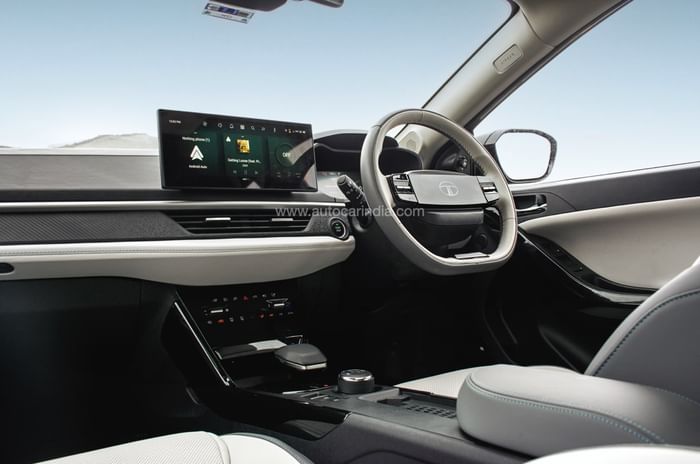 Nexon EV facelift's cabin a huge departure from the previous model; quality has taken a step up too
Nexon EV facelift's cabin a huge departure from the previous model; quality has taken a step up tooThere’s also more storage space and things like USB ports aren’t as difficult to access as in the Nexon EV. However, the dashboard layout is a letdown, which, in contrast to the Tata, feels too dated, and a lot of buttons make it look cluttered. The XUV’s longer length means that it has a bigger boot – 378 litres compared to the Nexon EV’s 350-litre space – and more rear legroom.
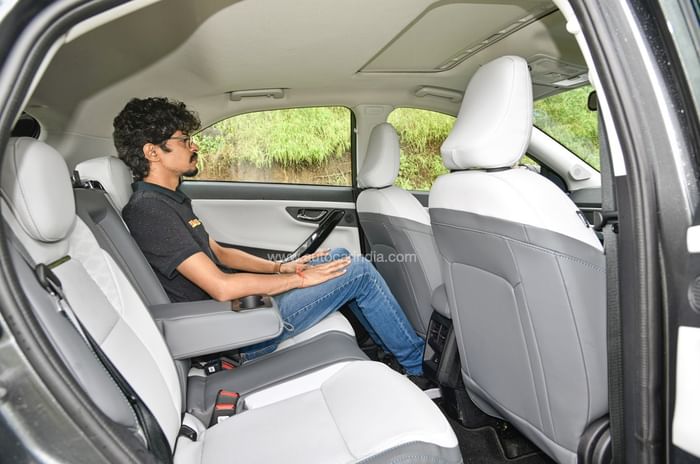
However, the seats aren’t as well-contoured or supportive as the Nexon EV’s, and they offer less under thigh support. Still, as it is wider, three adults will fit more comfortably in the back of the XUV, whereas in the Nexon EV, the seat is also contoured to suit two passengers. While space is better in the Mahindra at the back, what is a glaring omission here are AC vents and a charging port.
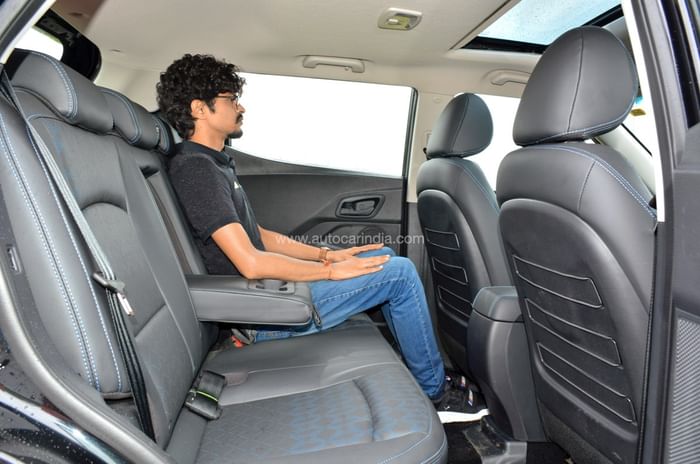
Tata Nexon EV vs Mahindra XUV400: features
Equipment is an area where the Tata blows away the Mahindra. Sure, the XUV has been updated to bring in some much-needed features it didn’t have previously like cruise control, ESP, hill-hold assist, an auto-dimming mirror, fog lamps and a tyre pressure loss indicator, but these are all things the Nexon EV already had before its facelift.
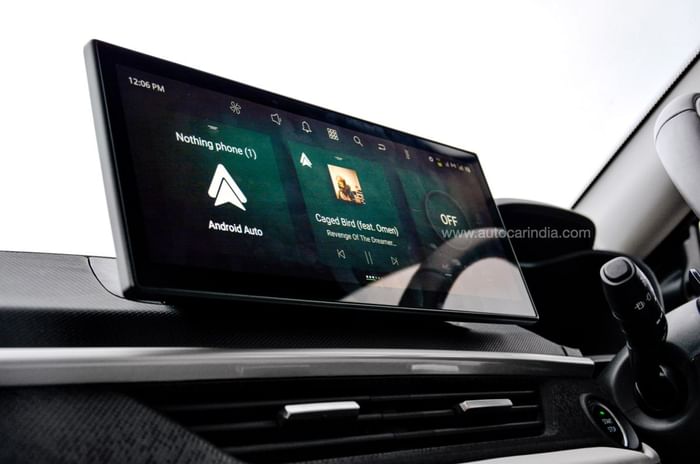 Tata's 12.3-inch screen is the better of the two
Tata's 12.3-inch screen is the better of the twoOver and above what the XUV400 offers, the Nexon EV facelift gets full LED lighting, ventilated front seats, a 10.25-inch fully digital instrument cluster, a larger 12.3-inch touchscreen, 360-degree camera, front parking sensors, auto climate control, wireless phone charger, wireless smartphone integration and an electronic parking brake. The Nexon EV’s superb JBL audio system that comes with a subwoofer is also leagues ahead of the XUV’s, which has gained two tweeters with this update.
 XUV's screen too small and not as slick
XUV's screen too small and not as slickFeatures common on both are auto headlamps and wipers, a sunroof, cruise control, 16-inch alloys, leatherette seats, connected car tech and six airbags (standard across the Nexon range).
Tata Nexon EV vs Mahindra XUV400: powertrain and performance
We’ve tested both these cars in their top-spec versions – the Long Range Empowered+ variant of the Nexon EV and the EL variant of the XUV400. Both feature a single electric motor powering the front wheels via a single-speed transmission.
However, the Nexon EV has gained an all-new motor, which is lighter, quieter and more efficient than the earlier one. As a result, output is different, at 145hp and 215Nm, which is 2hp more, but 35Nm less than the outgoing Nexon EV Max. The XUV400’s motor outmuscles the Nexon EV here as it has 150hp and 310Nm, which translates into their real-world performance as well.

In a quick back-to-back 0-100kph test run in damp conditions, the XUV took 9sec in Fearless mode, while the Nexon EV took 9.3secs in Sport mode. So the gap in acceleration times has now narrowed – the XUV becoming a bit slower with its ESP-controlled launch and the Nexon EV slightly quicker with its new motor.
Speaking of which, they both come with three drive modes and adjustable regenerative braking. However, it’s the Nexon EV that executes this better as you can choose the level of regen (via paddleshifters now) and the drive mode independently, whereas in the XUV they are bundled together. So in order to have the maximum performance in the XUV, you have to select Fearless mode, which will inadvertently also have the regen dialled all the way up.

As for how they deliver the power, the Nexon EV now feels more linear than before and Tata Motors says that it was a conscious decision to reduce the torque to improve driveability and efficiency. The drive modes in the Tata also have a significant effect on the throttle response. The XUV’s throttle response is sharper in its most sporty driving mode and, as a result, it feels quicker off the line.
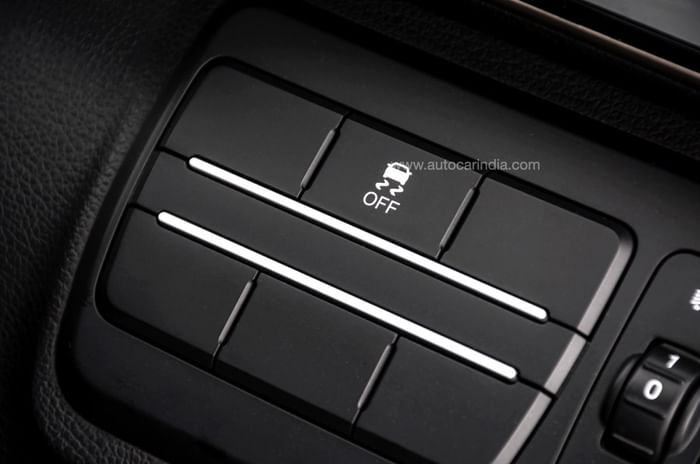 Mahindra now packs in much-needed ESP
Mahindra now packs in much-needed ESP However, the addition of ESP has dulled performance slightly, but it has also helped the XUV put its power down better. That was one of our main concerns with the earlier car, which would spin its wheels wildly with every prod of the accelerator.
As for braking, both SUVs here come with disc brakes all around, so stopping power is more than ample. However, it’s the XUV’s brakes that feel far stronger at the pedal, if a bit too grabby.
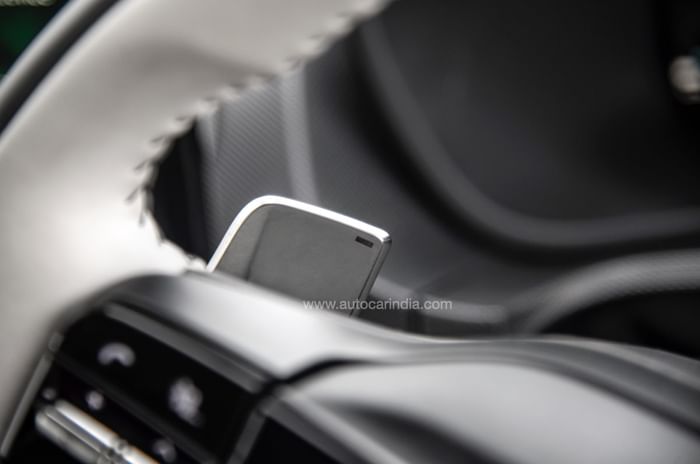 Nexon EV’s regen adjustable via new paddles.
Nexon EV’s regen adjustable via new paddles.In these guises, both have similar battery capacities, with the XUV getting a 39.4kWh pack with NMC cells and the Nexon EV having a 40.5kWh pack with a more modern LFP cell chemistry. Claimed range stands at 465km (ARAI) for the Nexon EV (28km more than before), while the XUV is said to do 456km (MIDC). While we didn’t have enough time to test the real-world range this time, in our last comparison test, the Mahindra managed 253km in the city and 234km on the highway on a single charge. However, Tata claims a 7.5 percent improvement in real-world efficiency for the Nexon EV facelift, so its figures could be a bit better.
As for charging, both these EVs come with a 7.2kW AC charger and they also support DC fast charging. The XUV has the edge here, however, as it can charge at up to 45kW, while the Nexon EV’s is capped at 30kW.
Tata Nexon EV vs Mahindra XUV400: ride and handling
Both SUVs feel very different in this department. The XUV feels more at home in the city thanks to its cushy low-speed ride and light steering. However, the flip side to this is that out on the highway, the Mahindra feels bouncy and the light steering feels disconnected while cornering. Uniquely, you can alter the heft of the steering in the XUV, but just like the regen modes, it is tied to the drive modes and can’t be adjusted independently.

The Nexon EV, in comparison, has a firmer suspension setup that can feel lumpy at low speeds, but it is definitely the more planted of the two at higher speeds. The quicker steering also has more weight and feedback, and coupled with the tidy body control, the Nexon EV is the better handler of the two. In conclusion then, the XUV400 feels more suited for city driving, while the Nexon EV is more composed out on the highway.
Tata Nexon EV vs Mahindra XUV400: price and verdict
Let’s talk money first. The Nexon EV facelift range is priced between Rs 14.74 lakh and Rs 19.94 lakh (introductory, ex-showroom, India), while the Mahindra XUV400 costs between Rs 15.99 lakh to Rs 19.39 lakh (ex-showroom, India). So the Nexon EV is more affordable at the lower end, but more expensive at the top end. However, factor in all the updates it’s received and you’ll find that it easily justifies its premium over the XUV. The Tata is also available in more variants and trims to choose from.
 There's a lot to like about both the Nexon EV and XUV400
There's a lot to like about both the Nexon EV and XUV400There is a lot to like about the XUV400, and it’s better at certain things than the Nexon EV, like rear seat and boot space, performance and low-speed ride. However, this SUV looks and feels nearly a decade old and the features list only backs this argument.
The Nexon EV, then, still remains the king of the hill; in fact, it’s gotten much better than before. And there’s a significant improvement in almost every department – be it performance, driveability, features, design and quality. There’s a reason why it’s the bestselling electric SUV on the market, and with this facelift, we believe it’ll continue to be so.
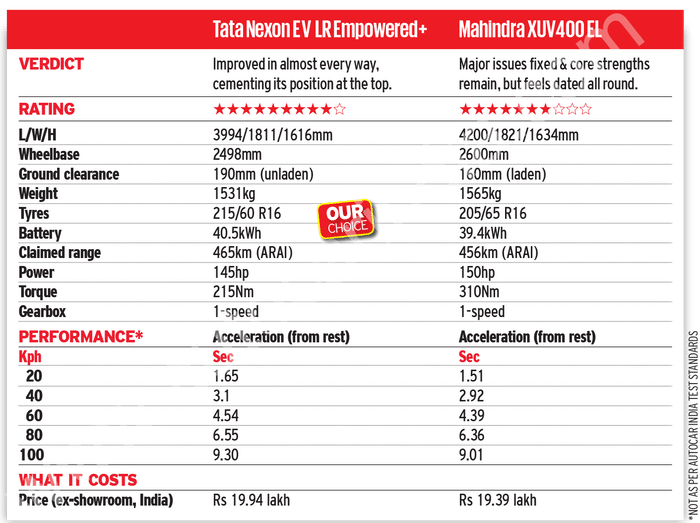
Also See:
Tata Nexon EV facelift vs Mahindra XUV400 comparison video
Copyright (c) Autocar India. All rights reserved.


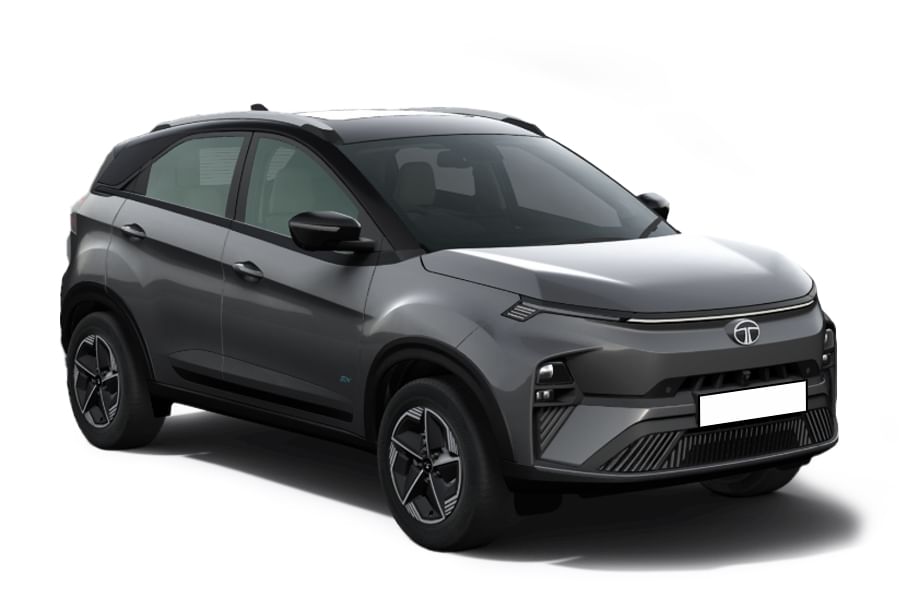



Comments
Member Login
Personal Details
No comments yet. Be the first to comment.